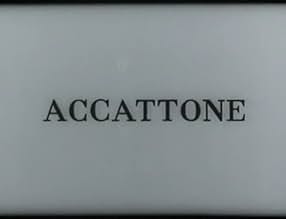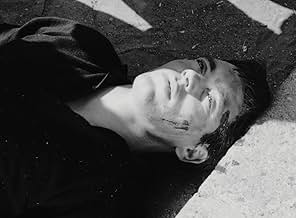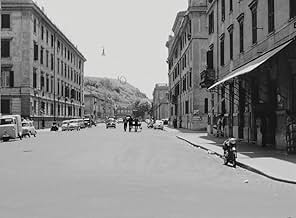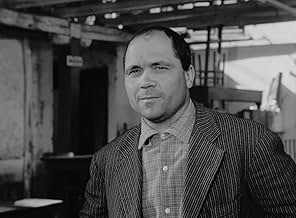IMDb रेटिंग
7.6/10
11 हज़ार
आपकी रेटिंग
अपनी भाषा में प्लॉट जोड़ेंA pimp with no other means to provide for himself finds his life spiraling out of control when his prostitute is sent to prison.A pimp with no other means to provide for himself finds his life spiraling out of control when his prostitute is sent to prison.A pimp with no other means to provide for himself finds his life spiraling out of control when his prostitute is sent to prison.
- 1 BAFTA अवार्ड के लिए नामांकित
- 3 जीत और कुल 4 नामांकन
फ़ीचर्ड समीक्षाएं
Accattone announces a director, Pier Paolo Pasolini, who is a haunting/haunted poet from his surroundings and realist, someone who wants to put his eye on the world without flinching on the details of how 'ordinary' (of the street) people speak and interact, how raw and uninhibited they can be, these being the guys on the streets who are vulgar and coarse at best and at worst are abusers of women. But at the same time what one comes away with is poetry in documentary form - it's another level of neo-realism, a little more like an urban story than a post-war treatise that still throbs with the importance of those in poverty. Anytime I hear the song Matthaus Passion I'll immediately contemplate those harsh images of Vittorio Accattone, being cast aside by his family for being a pimp, or that poor girl being beaten at night by that gang of men, which is something that elevates such hard scenes into art.
Vittorio Accattone is the main character- charming and attractive, and also a perpetual scoundrel who also is a total outcast. He has a wife and kid(s), but is estranged from them by choice - her choice most likely - and he finds himself in big trouble once his main prostitute, Maddalena, is sent to prison for a bad informing job. It's after this we see Accatone on his potential path to redemption when he meets a supremely sweet and average girl from out of town, Stella, who he may eye as a new girl on the street... or perhaps not, as his attachment to her grows more and stronger, in spite of what and who are around him every day and night in the dirty province.
He's someone we want to root for in being a better person, or, perhaps even, better at what he does. He's a tragic anti-hero in a New-Wave sort of sense, cool looking and aspiring to be modern and cool (and maybe he is, up to a point), but also poor and uneducated, so much so that being on the fringe and being called "PIMP!" is what he's been reduced to by default. The performance from Franco Citti is one thing that keeps the viewer locked in: he's so good here because he looks plucked right off the street by Pasolini, as would turn to be his method with choosing most of his 'actors' on camera. There's a reality to his interactions with his friends (so called) or his business associates. Some of their dialog and tones of speech aren't refined or look trained. At one point when Citti's Vittorio breaks down in tears- a sudden turn from a previous scene showing more attitude- is authentic, even as another actor could have possibly played it "better".
It is what Pasolini wants, and he gets it, much in the same way he also gets a view of this side of Rome in a way that hasn't been seen before up until this time. His DP Tonino Delli Colli shoots simply often, and sometimes not so much - there's complexity, say, to a tracking shot in front of Accatone talking to a girl who is on a bicycle, or when we see the horrorshow of the men taking Maddalena at night in the middle of nowhere, the only lights starkly coming from the car. The effect is nothing short of a slow-burn. While a few of the actors do fall a bit too flat, and some scenes come close to lagging around (the editing might be the most significant flaw here), the raw emotion and fire in the subject matter keeps things fascinating. You want to see what happens with this young guy, and it's his tragedy that gets us absorbed, even as the Bach music abstracts the sorrow, and agonizing poetry of the streets, and it's this that makes it a classic.
Only downside I must mention - if you live in the US, or happen to watch it on a DVD or online from Walter Bearer films, the print is just not very good. It's the sort where the white subtitles drop in and out of view depending on who's standing where in a frame. It's not totally detrimental, but some scenes become hard to follow due to the poor quality of the subtitles with the print. This, if for no other reason, demands the film receive the Criteron treatment.
Vittorio Accattone is the main character- charming and attractive, and also a perpetual scoundrel who also is a total outcast. He has a wife and kid(s), but is estranged from them by choice - her choice most likely - and he finds himself in big trouble once his main prostitute, Maddalena, is sent to prison for a bad informing job. It's after this we see Accatone on his potential path to redemption when he meets a supremely sweet and average girl from out of town, Stella, who he may eye as a new girl on the street... or perhaps not, as his attachment to her grows more and stronger, in spite of what and who are around him every day and night in the dirty province.
He's someone we want to root for in being a better person, or, perhaps even, better at what he does. He's a tragic anti-hero in a New-Wave sort of sense, cool looking and aspiring to be modern and cool (and maybe he is, up to a point), but also poor and uneducated, so much so that being on the fringe and being called "PIMP!" is what he's been reduced to by default. The performance from Franco Citti is one thing that keeps the viewer locked in: he's so good here because he looks plucked right off the street by Pasolini, as would turn to be his method with choosing most of his 'actors' on camera. There's a reality to his interactions with his friends (so called) or his business associates. Some of their dialog and tones of speech aren't refined or look trained. At one point when Citti's Vittorio breaks down in tears- a sudden turn from a previous scene showing more attitude- is authentic, even as another actor could have possibly played it "better".
It is what Pasolini wants, and he gets it, much in the same way he also gets a view of this side of Rome in a way that hasn't been seen before up until this time. His DP Tonino Delli Colli shoots simply often, and sometimes not so much - there's complexity, say, to a tracking shot in front of Accatone talking to a girl who is on a bicycle, or when we see the horrorshow of the men taking Maddalena at night in the middle of nowhere, the only lights starkly coming from the car. The effect is nothing short of a slow-burn. While a few of the actors do fall a bit too flat, and some scenes come close to lagging around (the editing might be the most significant flaw here), the raw emotion and fire in the subject matter keeps things fascinating. You want to see what happens with this young guy, and it's his tragedy that gets us absorbed, even as the Bach music abstracts the sorrow, and agonizing poetry of the streets, and it's this that makes it a classic.
Only downside I must mention - if you live in the US, or happen to watch it on a DVD or online from Walter Bearer films, the print is just not very good. It's the sort where the white subtitles drop in and out of view depending on who's standing where in a frame. It's not totally detrimental, but some scenes become hard to follow due to the poor quality of the subtitles with the print. This, if for no other reason, demands the film receive the Criteron treatment.
Yes, it has some not so good scenes, bad lightning and it´s far from Passolini's beautiful aesthetic, but still, this movie is a masterpiece for what it represents. A brilliant start for a genius career, powerful and great story, and Pasolini's essence all over.
Accattone is a Neo-Realist examination of slovenly irresponsibility, tastelessness and self-pity - you know, the fun stuff. Its principal characters, a group of young upwardly-immobile Roman males, are almost uniformly repulsive, a lot of chest-baring half-savages whose idea of fun is luring a whore to a deserted spot and beating her to within an inch of her life. Its hero, Accattone, is played by one of the more unpleasant actors in the history of film, a fellow named Franco Citti, who manages to single-handedly set the entire nation of Italy back about two-hundred years. It is a film of almost relentless despair, depicting a Rome so desolate and squalid, so bereft of hope, that it seems almost medieval. In the hands of almost any director the movie would be unbearable - either unbearably sentimental or unbearably grim - but with Pasolini at the helm it is merely honest.
It isn't Pasolini's best film by a long way, but it may be the clearest example of what made the director so special - his ability to probe around the most revolting recesses of the human condition without seeming sensationalistic, exploitive or crass. It would be easy to go one of two directions with a character like Accattone, a lazy two-bit pimp with a son by a woman who wants nothing to do with him: the sentimental route or the grotesque. One could easily imagine De Sica, the soft-heart of Neo-Realism, turning Accattone into a sympathetic, misunderstood Everyman. And one could just as easily imagine Fellini, the most uptight director maybe in history, transforming the character into a universal symbol of societal decay. Pasolini, neither a sentimentalist nor a moralist, sees Accattone not as a sympathetic character nor as a symbol. The least judgmental director maybe ever, Pasolini conceives his characters entirely in terms of their outward behavior, and not in moral terms. He neither psycho-analyzes nor seeks to "understand" his characters. He simply presents them as they are, warts and all.
It was always the purpose of Neo-Realism to present life as it was lived, not life as it was imagined by screenwriters, directors and actors, and there are few more successful ventures in this regard than Accattone. The film's main triumph is in its atmosphere. The Roman days have never seemed so sun-bleached, so arid and oppressive; its nights never so mysterious, so full of inexpressible longing (not even in Henry James). The characters seem bound to this world in a palpable way, their faces (shot by expert cinematographer Tonino Delli Colli) mirroring the desolation, the hopelessness, the strangeness of their surroundings. The movie's physicality, as always with Pasolini, is striking. But pure physical vigor, pure atmosphere isn't enough. Where Pasolini comes up short is in assembling the parts of his film into something with real emotional breadth. His first feature shows him already on his way to being a master of the image, but also shows that he had a lot to learn about being a master of cinematic rhythm. The strange blend of primitivism and modernism is already there but the command is not. It's a film that works well in the moment but feels thin as a whole. It's a triumph of Neo-Realist technique but it only half-succeeds as a film.
Half-successful Pasolini is still better than the best most directors have to give. If you can portray a character as repulsive, as boorish and ego-maniacal as Accattone - a character with few if any redeeming features - for two hours without alienating your audience...well, chalk one up for the director who can do that. Especially one who manages the trick without resorting to sentimental contrivance or the kind of false significance people like Fellini always tried to drum up by filling their movies with obvious symbols, the sorts of things art-film zombies love because it gives them a chance to show their alleged smarts. Pasolini never flatters his audience but he never sneers at them either. He attempts to neither ingratiate himself with the public nor antagonize it in the manner of certain self-important avant-gardists. The best artists look for what interests them in a piece of material, not worrying whether their ideas, their approach, their style is accessible to the public at large, or critics, or scholars, or their grandmothers or anyone else. Accattone shows Pasolini on the road that would make him one of cinema's best directors - a road traveled by precisely one person, Pasolini himself.
It isn't Pasolini's best film by a long way, but it may be the clearest example of what made the director so special - his ability to probe around the most revolting recesses of the human condition without seeming sensationalistic, exploitive or crass. It would be easy to go one of two directions with a character like Accattone, a lazy two-bit pimp with a son by a woman who wants nothing to do with him: the sentimental route or the grotesque. One could easily imagine De Sica, the soft-heart of Neo-Realism, turning Accattone into a sympathetic, misunderstood Everyman. And one could just as easily imagine Fellini, the most uptight director maybe in history, transforming the character into a universal symbol of societal decay. Pasolini, neither a sentimentalist nor a moralist, sees Accattone not as a sympathetic character nor as a symbol. The least judgmental director maybe ever, Pasolini conceives his characters entirely in terms of their outward behavior, and not in moral terms. He neither psycho-analyzes nor seeks to "understand" his characters. He simply presents them as they are, warts and all.
It was always the purpose of Neo-Realism to present life as it was lived, not life as it was imagined by screenwriters, directors and actors, and there are few more successful ventures in this regard than Accattone. The film's main triumph is in its atmosphere. The Roman days have never seemed so sun-bleached, so arid and oppressive; its nights never so mysterious, so full of inexpressible longing (not even in Henry James). The characters seem bound to this world in a palpable way, their faces (shot by expert cinematographer Tonino Delli Colli) mirroring the desolation, the hopelessness, the strangeness of their surroundings. The movie's physicality, as always with Pasolini, is striking. But pure physical vigor, pure atmosphere isn't enough. Where Pasolini comes up short is in assembling the parts of his film into something with real emotional breadth. His first feature shows him already on his way to being a master of the image, but also shows that he had a lot to learn about being a master of cinematic rhythm. The strange blend of primitivism and modernism is already there but the command is not. It's a film that works well in the moment but feels thin as a whole. It's a triumph of Neo-Realist technique but it only half-succeeds as a film.
Half-successful Pasolini is still better than the best most directors have to give. If you can portray a character as repulsive, as boorish and ego-maniacal as Accattone - a character with few if any redeeming features - for two hours without alienating your audience...well, chalk one up for the director who can do that. Especially one who manages the trick without resorting to sentimental contrivance or the kind of false significance people like Fellini always tried to drum up by filling their movies with obvious symbols, the sorts of things art-film zombies love because it gives them a chance to show their alleged smarts. Pasolini never flatters his audience but he never sneers at them either. He attempts to neither ingratiate himself with the public nor antagonize it in the manner of certain self-important avant-gardists. The best artists look for what interests them in a piece of material, not worrying whether their ideas, their approach, their style is accessible to the public at large, or critics, or scholars, or their grandmothers or anyone else. Accattone shows Pasolini on the road that would make him one of cinema's best directors - a road traveled by precisely one person, Pasolini himself.
Just to start with, Accattone was not filmed in Naples but in Rome. Someone might have brought to that understanding by some Neapolitans gangsters that appear at some point in the movie As for the "ruins" that scatter the landscape, they are mostly buildings that will soon replace the barracks such as the one in which Accattone lives, or the Acquedotto Felice, an ancient Roman aqueduct that runs close to Prenestina and Casilina, two Roman suburbs, that you can see in Mamma Roma as well. Franco Citti, the character of Accattone, perfectly embodies the roman lumpenproletariat of the time: idle, fatalistic and desperate. Pasolini met Franco's brother Sergio, a plasterer, hanging around Cinecittà in 1951. He introduced him to his brother Franco that became Pasolini's dialectical adviser for Accattone, Mamma Roma and his book "Ragazzi di vita"; his "living vocabulary" as he called him. Indeed, Pasolini interests for dialects and slangs (Roman is not really a dialect anymore but a slang) was not disappointed. The dialogues between the characters are full of fantasy: rude and in some way reminiscent of their peasant past. A must see if you're interested in Neorealism and in the "ways of the underworld lumpenproletariat". Someone connected this movie with Bunuel's "Los Olvidados". I definitely agree.
Accattone is a Roman pimp who lives off his girlfriend Maddalena's earnings. Pasolini's cheeky aim is to put forward this young man as a modern saint. To this end he lathers Bach's St Matthew's Passion (inspired by the Apostle's experience of the crucifixion of Christ) over scenes of Accattone's life. Indeed in one of Accattone's first scenes he's shown devouring a slice of tomato, displayed horizontally as if a cardinal's galero, whilst an sculpture of perhaps a guardian angel can be seen over his shoulder in the distance (an anti-clerical pro-Christ stance seems to be a consistent theme for Pasolini). Later, a prophecy regarding Accattone's descent is eerily similar to Christ's pronunciation of Peter's forthcoming triple renunciation.
The film reminded me of a DH Lawrence poem (elliptically titled Democracy):
"I love the sun in any man / when I see it between his brows / clear, and fearless, even if tiny // But when I see these grey successful men / so hideous and corpse-like, utterly sunless, / like gross successful slaves mechanically waddling / then I am more than radical, I want to work a guillotine
...
I feel that when people have gone utterly sunless / they shouldn't exist."
Whatever Accattone is, he's not sunless; when he tries out the world of work (legitimate work involving labour), he becomes Vittorio, his Christian name, and the light goes out. The film reminds me very much of Fassbinder's Gods of the Plague in that sense, young men with brio but no skills or education who, given the choice, between drudgery or crime, choose crime. Both films polemicise against urban post-industrial capitalist societies, which have become increasingly removed from the milieu in which humanity evolved and is "designed" to cope with. When Accattone compares the chore of lifting rolls of iron with the horrors of Buchenwald the film goes a little over the top.
Of course someone viewing Accattone and his friends through less of a haze of desire than the director might think that they were just a bunch of jerks. Undeniably though, Pasolini is a great poet, and there's evidence of things to come here, the film whilst looking largely Bertoluccian (he was the assistant director), has the occasional master shot, for example the rolling hills and valley in the dream sequence, par with Leonardo in quality of composition and symbolism; the countryside here representing an idealised rural precursor to Accattone's slum existence.
I also applaud Pasolini for taking his arguments beyond class, Accattone's group of spongers contains educated men as well as dunces, and they are equally disdainful of the ruling class as they are of proletarians.
The film reminded me of a DH Lawrence poem (elliptically titled Democracy):
"I love the sun in any man / when I see it between his brows / clear, and fearless, even if tiny // But when I see these grey successful men / so hideous and corpse-like, utterly sunless, / like gross successful slaves mechanically waddling / then I am more than radical, I want to work a guillotine
...
I feel that when people have gone utterly sunless / they shouldn't exist."
Whatever Accattone is, he's not sunless; when he tries out the world of work (legitimate work involving labour), he becomes Vittorio, his Christian name, and the light goes out. The film reminds me very much of Fassbinder's Gods of the Plague in that sense, young men with brio but no skills or education who, given the choice, between drudgery or crime, choose crime. Both films polemicise against urban post-industrial capitalist societies, which have become increasingly removed from the milieu in which humanity evolved and is "designed" to cope with. When Accattone compares the chore of lifting rolls of iron with the horrors of Buchenwald the film goes a little over the top.
Of course someone viewing Accattone and his friends through less of a haze of desire than the director might think that they were just a bunch of jerks. Undeniably though, Pasolini is a great poet, and there's evidence of things to come here, the film whilst looking largely Bertoluccian (he was the assistant director), has the occasional master shot, for example the rolling hills and valley in the dream sequence, par with Leonardo in quality of composition and symbolism; the countryside here representing an idealised rural precursor to Accattone's slum existence.
I also applaud Pasolini for taking his arguments beyond class, Accattone's group of spongers contains educated men as well as dunces, and they are equally disdainful of the ruling class as they are of proletarians.
क्या आपको पता है
- ट्रिवियाThis was Bernardo Bertolucci's first work in movies. He was an assistant director.
- गूफ़The shadow of the camera is clearly visible on Accattone's shirt when he walks away towards the camera after the fight with Ascenza's Brother.
- भाव
Vittorio "Accattone" Cataldi: Call me Accattone. There are lots of Vittorios but I'm the only Accattone.
- इसके अलावा अन्य वर्जनThe VHS and DVD versions produced by Water Bearer Films are listed as running 116 minutes, suggesting that this print is four minutes shorter than the original release.
- साउंडट्रैकSt Matthew Passion
Composed by Johann Sebastian Bach
टॉप पसंद
रेटिंग देने के लिए साइन-इन करें और वैयक्तिकृत सुझावों के लिए वॉचलिस्ट करें
- How long is Accattone?Alexa द्वारा संचालित
विवरण
- रिलीज़ की तारीख़
- कंट्री ऑफ़ ओरिजिन
- भाषाएं
- इस रूप में भी जाना जाता है
- The Scrounger
- फ़िल्माने की जगहें
- Ponte Testaccio, रोम, लाज़ियो, इटली(motorbike accident)
- उत्पादन कंपनियां
- IMDbPro पर और कंपनी क्रेडिट देखें
बॉक्स ऑफ़िस
- दुनिया भर में सकल
- $2,865
- चलने की अवधि1 घंटा 57 मिनट
- रंग
- ध्वनि मिश्रण
- पक्ष अनुपात
- 1.37 : 1
इस पेज में योगदान दें
किसी बदलाव का सुझाव दें या अनुपलब्ध कॉन्टेंट जोड़ें

































